“Sound of Metal” (2019 production, 2020 release). Cast: Riz Ahmed, Olivia Cooke, Paul Raci, Lauren Ridloff, Mathieu Amalric, Chelsea Lee, Shakeem Sanchez, Rena Maliszewski, Tom Kemp. Director: Darius Marder. Screenplay: Darius Marder and Abraham Marder. Story: Darius Marder and Derek Cianfrance. Web site. Trailer.
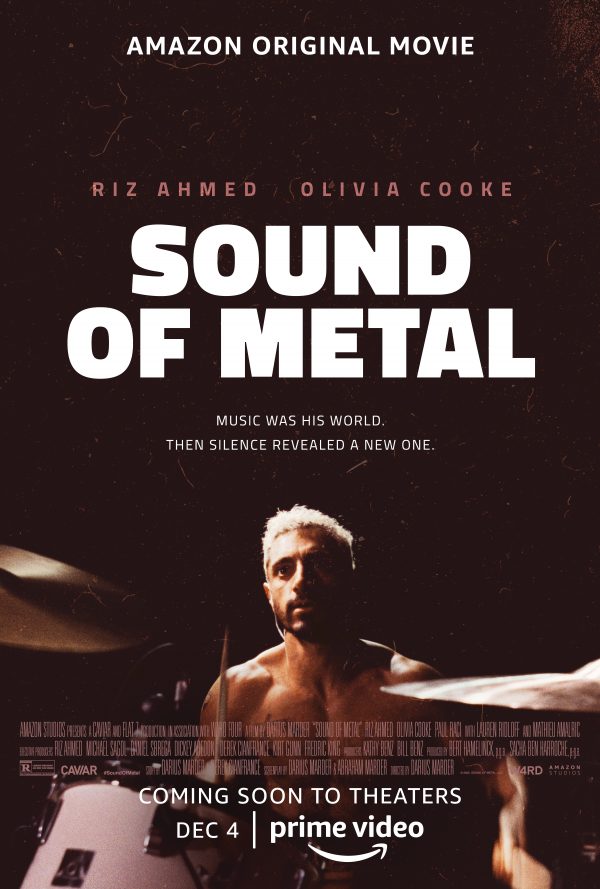
When we stumble in life, getting back on track can be difficult, but, when we do, the feeling can be quite gratifying. However, if that reawakening is intruded upon by some kind of new setback, we may be left discouraged and disheartened. All that work may have seemingly gone for naught. But what if this new development is intended to take us to an even higher level than what we’ve achieved through our initial comeback? We’ve likely already seen that our first turnaround brought us redemption we probably never thought we’d attain, so why couldn’t it happen again – and this time on an even grander scale? That’s the challenge faced by an artist looking to walk the path of redemption in the compelling new drama, “Sound of Metal.”
After years of struggling to get clean, recovering addict Ruben Stone (Riz Ahmed) finally seems to have found himself. As a drummer for a heavy metal duo with his girlfriend, Lou Berger (Olivia Cooke), Ruben and his significant other tour the country in their RV, mostly playing one-nighters at small venues trying to make a name for themselves and generate some cash along the way. They seem relatively happy, thanks to their romantic and artistic collaboration. But there’s more to their relationship than this: They’re recovery partners. Lou helped Ruben kick his addictions to an array of substances, while he helped her break the habit of intentionally hurting herself. It’s an arrangement that has proved fruitful on so many fronts.
Which is why what happens next is so demoralizing. Suddenly and quite unexpectedly, Ruben notices a dramatic hearing loss. At first it seems intermittent, but it deteriorates severely not long thereafter, reaching a point where a specialist, Dr. Paysinger (Tom Kemp), measures his hearing capacity at just a few notches above 20 percent – and failing fast. Ruben desperately asks the doctor about treatments, but he offers little hope, delivering the news that he’s on the fast track toward deafness. The only solution Dr. Paysinger offers is the possibility of surgery involving cochlear implants, devices designed to help restore at least some of the patient’s lost hearing. However, he notes that the procedure and equipment are quite expensive – usually in the range of $40,000 to $80,000 – and that insurance rarely covers the cost.
Needless to say, Ruben is devastated. He sees this development as the end of his music career – and with that, a fundamental loss of his new identity. The stress of the situation troubles him so much that the thought of going back to using crosses his mind. Lou tries to offer comfort, but, given her own history, she’s placed in jeopardy of backsliding as well. Given these conditions, as well as the fact that Ruben is in no position to afford the implant surgery, a specially tailored solution to these circumstances is warranted. But what?
After contacting Ruben’s manager, a possible answer surfaces. He puts Ruben in touch with Joe (Paul Raci), manager of a rehab community for the deaf. The Vietnam veteran, who lost his hearing (and virtually everything else in his life) in an accident, meets with Ruben at the community’s idyllic rural facility to explain what’s involved in his treatment. And, as the plan’s details are explained, Ruben is less than enthusiastic.
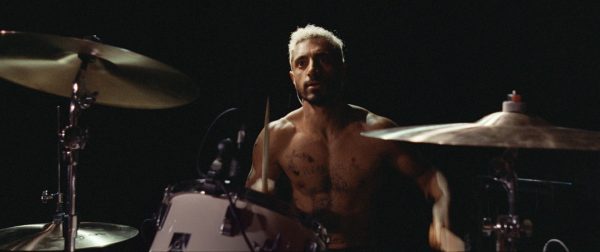
In essence, Joe tells Ruben that he will teach him how to be a deaf person, a revelation that comes as a shock. It goes against everything that Ruben is hoping for, namely, finding a way to come up with the funds to pay for the surgery that he’s obsessed with getting to restore his hearing. But, as Joe further explains, he wants Ruben to come to see himself in the same light as the rest of the members of the community – as people who view their condition as a difference, not a disability. Joe also stresses that, if Ruben is willing to follow the plan and adapt to these circumstances, he will likely find his life as fulfilling – if not more so – than what he experienced prior to coming there.
Given Ruben’s unsettled past, as well as his troubled present, both of which are characterized by keeping a tight lid on his feelings, the prospect of potentially finding inner peace appeals to him. But can he achieve it? It means moving into the community, giving up his RV and cell phone, and, perhaps most troubling, saying goodbye to Lou, at least for the near future. He’ll also need to learn American Sign Language and find ways to integrate himself into a community of strangers, all of whom seem to feel quite differently about their hearing loss from the way he does. And, all the while, thoughts of getting that surgery and raising the money for it linger just below the surface of his consciousness.
At first, Ruben struggles to fit in. He finds communication challenging. He views the restrictions placed upon him with frustration. He even looks for ways to circumvent the rules. What’s more, he’s worried about Lou, fearing that she’ll fall off her own wagon without his presence. But Joe will have none of it. He gives Ruben a series of assignments to come to terms with his situation, most notably journaling his feelings – not just about recent events but about everything that brought him to this point in his life. He stresses that the silence that has recently been imposed upon him could actually prove to be an ally in that process; without the audio distractions of the hearing world, he might be able to tune in to aspects of himself that have long gone ignored, showing him a way out of his current challenge and providing him with a path for his future. Of course, quite ironically, the question here is, “Will he listen?”
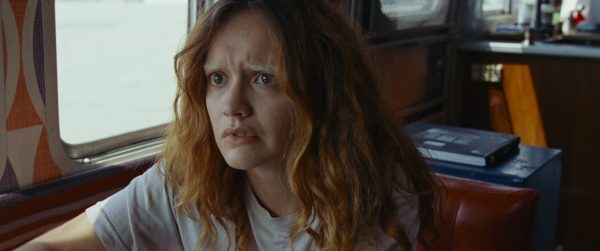
As Ruben spends more time among community members, he begins to adapt, finding a sort of extended family that he’s never really had before. They appreciate him, and he sees that, making it possible for him to return the favor. He even learns that he’s able to teach others how to play the drums, showing him that music can still be a part of his life. Indeed, everything that Joe had said would emerge appears to be coming true. But did Ruben really hear the message? And what will his response mean for the future that awaits him?
It’s disheartening when life doesn’t work out as planned. That’s especially true when it takes a drastic left turn, moving in a direction far removed from what we hoped for. But sometimes those seeming missteps unexpectedly usher us toward enviable goals, some of them more rewarding than originally imagined. Of course, that may not always be easy to see at that point, but, if we take the time to analyze the circumstances, we might end up pleasantly surprised.
The analysis process requires going within and taking a good hard look at ourselves, particularly our beliefs. And that’s important because our beliefs are the driving force in the conscious creation process, the philosophy that maintains we draw upon these resources in manifesting the reality we experience, for better or worse, in all its aspects. That includes those aforementioned left turns. As much as we may dislike those developments and try to distance ourselves from them, they nevertheless originate with us and our beliefs, and, as unlikely as it may seem, we all create them for a purpose, even if that’s not obvious at first glance.
Such is the kind of frustration that Ruben experiences. Indeed, one might legitimately wonder why a musician would create going deaf, especially by the individual at the center of such a scenario. Given the many trials and tribulations Ruben apparently experienced prior to becoming a drummer, it seems unfair that he would develop a potentially crippling impairment just as he’s found his calling in life. So what’s behind this? That’s what he needs to discover for himself, and that’s where the analysis process comes in.
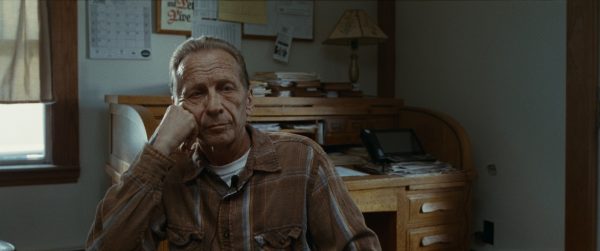
Ruben is slow to embrace the process, however. He lets his fears get in the way. He doesn’t allow himself to see a way out by considering alternatives and/or unconventional responses. And he’s still gravitating toward distractions that keep him from addressing the task at hand. Under those conditions, it’s no wonder he initially makes little progress. His resistance is far too great to enable much, if any, forward movement.
However, as he settles in to his new environment, circumstances and routine, he begins to shift his focus. These transitionary elements, brought about by subtle changes in his beliefs (even if he doesn’t recognize them), allow him to adapt to his life as a deaf person. As Joe told him, he begins to see his lack of hearing as a difference, not a disability. In fact, it enables him to feel part of a community that he hadn’t previously known, one that has its own culture and way of looking at the world. He discovers that it can offer him a new direction in life, one that he hadn’t anticipated when he launched into this process.
As eluded to above, he starts to move past the fears that were holding him back. But this involves more than just his apprehension over losing his hearing. He begins to see the deep-seeded fears that have dogged him much of his life, including those that prompted him to escape into addiction as a coping mechanism (as well as all the fallout that came from that and from getting clean). This removes some of the seemingly impenetrable barriers that have blocked his progress.
Overcoming fears, in turn, opens up new doors, such as the ability to think outside the box. He’s able to envision new courses of action that he was previously unable to see. Discovering that he can teach drumming to other deaf persons, for example, was a path he once thought inconceivable. This may take him in a direction different from what he had once known as a musician, but this venture still involves music. It may even be one that he finds more fulfilling since it surpasses limitations that he believed couldn’t be overcome, providing him with the satisfaction that comes from stretching as an artist, one of the most gratifying achievements that can arise from a creative endeavor.
These developments can then lead to something even more profound – redemption. Starting over might not be easy, especially when it seems like we’re beginning at square one. However, when we see how it enables us to overcome fears and exceed limitations, it shows us that we can become more than we thought we could be, particularly when we’re seeking to make up for what we perceive as past shortfalls. It helps us better understand recent events, as well as those that led up to them, including the beliefs we held and the decisions we made in selecting the path we chose. That puts an entirely new perspective on things. Under these circumstances, we truly can redeem ourselves.
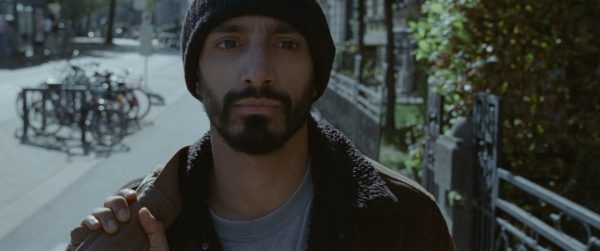
This is perhaps best achieved when immersing ourselves in our innate inner silence. The stillness of that contemplative space allows us to focus entirely on who we are, how we became that way and the beliefs that led us to it. Of course, it’s difficult to make use of that resource if we’re constantly being distracted by outside influences. They draw our attention away and prevent us from concentrating on the task at hand.
This last phase of reawakening is something Ruben struggles with. While he may have addressed his fears and the limitations that hold him back, he has trouble going the final mile. He may say he seeks redemption, but he has difficulty taking the last steps – of allowing himself to sit in his inner stillness and let the silence wash over him to reveal what he needs to see. He must ask himself why that intimidates him and trust the process that Joe has outlined for him. If he fails to do so, though, he may never find what he’s looking for. So will he? That’s what he and viewers must wait to find out. Should he do so, however, that elusive stab at redemption just might be fulfilled.
When our dreams and the life we know evaporate in an instant, we may find it next to impossible to adjust, as is the case in this engaging debut drama from director Darius Marder. While this offering has a little trouble finding its footing at times, it nevertheless takes audiences through the challenges associated with hearing loss and a recovering addict’s struggle to maintain sobriety in the wake of profound change. The film also skillfully delves into matters of adaptability and self-acceptance, as well as learning how to see “disabilities” as differences, not handicaps, qualities with the potential to give us new and unconsidered perspectives on our existence. All of this is brought to life through the fine performances of Ahmed, Cooke and Raci, as well as an inventive sound design that truly makes an impact on viewers. “Sound of Metal” is indeed one of the year’s best, available for streaming exclusively on Amazon Prime Video.
“Sound of Metal” has been widely praised in critics’ circles and has been lavishly accorded nominations in this year’s awards competitions. The picture has been named the American Film Institute Movie of the Year, one of the year’s Top 10 Films by the National Board of Review and a best first feature nominee in the Independent Spirit Awards competition. It has also earned a best picture nomination in the Critics Choice Awards competition, where it also captured nods for best editing and best original screenplay. The film’s performances have not gone without recognition either, with Ahmed and Raci being named best lead and supporting actor, respectively, by the National Board of Review. Both have also received Critics Choice and Independent Spirit Award nods for their respective performances, with Ahmed also earning nominations in the Golden Globe and Screen Actors Guild Award contests.
We’ve all no doubt heard the expression “Everything happens for a reason.” It’s a saying that many of us readily take to heart in moments of inspiration, but it’s also one that gets put to the test when we incur some kind of seeming adversity. What then? The question of why invariably surfaces, the answers to which are nearly always elusive. However, if we take the time to examine where we’re at, who we are and how we got there, all without distraction, the solutions frequently emerge with startling clarity, opening our eyes to possibilities we hadn’t expected, considered or even envisioned. The redemption and rewards to come out of such situations are often beyond what we may have imagined, setting us on new and enlightening paths that allow us to discover newfound blessings – and to see them for the miracles of creation that they truly are.
Copyright © 2021, by Brent Marchant. All rights reserved.

No comments:
Post a Comment